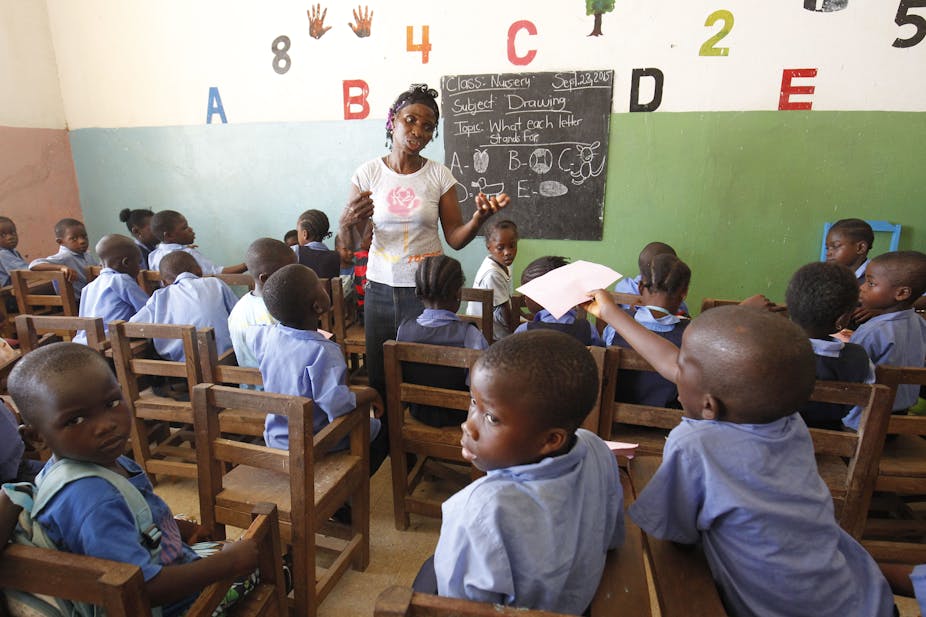There are a number of fundamentals that ought to be in place for children to learn. These include caring school environments, well trained teachers and engaged communities.
But too often, it’s these fundamentals which are being ignored.
Educational expert Professor Jonathan Jansen puts it best when, speaking particularly of the South African context, he laments that
We’re not getting the basics right
He’s correct. Field work a team and I undertook in South Africa’s Western Cape province shows just how often fundamental issues are neglected in schools. The state of the country’s ailing school system looms large above the myriad of challenges facing the young democracy.
Our research offers some hope, showing that even schools in poor communities with very few resources can be fairly successful when they do get the basics right.
Successful schools’ secrets
The overriding question in our research was how largely indigent school communities get the basics right even when their circumstances suggest they will fail. The findings suggest that schools succeed when everyone involved in the system, from the government’s department of basic education through to pupils’ parents, gets involved.
The department’s intervention and support remains essential. For instance, district officials are probably the most important interface between schools and the department. All of the principals and teachers at the exemplary schools highlighted the important role performed by their respective district officials, who offered support and guidance with curriculum delivery.
Sadly, such engagement is not the norm. Studies show that district officials rarely support or even visit under-performing schools. This leaves teachers feeling isolated, neglected, helpless and bewildered. Their work suffers. So children’s performance remains poor.
This is clearly an area the department needs to improve. But there are a number of thorny areas where it can only perform an advisory or supporting role. There are also areas where it is almost powerless and where other constituents can and must play a role.
What stood out
For starters, the successful schools we visited had an array of teaching aids, wall paintings and charts. This may seem unimportant, but such basic processes enhance the transfer of facts, knowledge, concepts, ideas and skills. This boosts pupils’ awareness, understanding and their memory skills.

Changes or additions to the curriculum can help too. Most of the schools we visited had a dedicated expressive arts component built into their programme. Research by Susan Hallam, a professor of education and music psychology, has found that music can increase social cohesion, social adjustment and positive attitudes, particularly in low-ability pupils.
Music making, Hallam’s research shows, also boosts self-discipline and concentration, both key to educational progression.
Some of the schools also had freestyle dance classes. This, too, can boost self-confidence. It also allows children from economically depressed backgrounds to have some harmless, shared enjoyment - which is sadly often lacking in dysfunctional schools.
Community services, involvement and inclusion
The field work confirmed what other research has long shown: for schools to succeed, the broader community must play a role.
Children who receive meaningful, productive support and help at home tend to perform better in the classroom as well as in exams. This includes support with homework and encouragement in reading, for instance. But what of children whose parents cannot read or do not read regularly, as is often the case in rural areas?
At the schools we visited, parents - even those with minimal schooling - are offered basic insight into what is expected of their children at school. This puts them in a far better position to more realistically assist with homework and test preparation.
Then there was the active role of volunteers drawn from the communities surrounding the schools. They took on school administrative work, enabling staff to devote more time to actual teaching.

Volunteers also help to establish school libraries. In one area we visited, this had become a valuable resource for the community.
Broader societal issues
South African schools don’t exist in a vacuum. In the rural areas we visited, poverty, inequality and hunger were all daily realities. But the schools that performed against the odds were tackling these issues constructively, which contributed to their success.
The schools devoted special time and effort to providing daily meals. Academic Olivia Engelbrecht has pointed out that poor nutrition can cause deficits in attention span, sensory impairments, and in the end, keep kids away from school.
It’s not just about satisfying hunger, though. When children are fed they feel cared for and this brings pride and dignity. This in turn inspires them to function far better in class. As my fieldwork showed, community members can play a meaningful role here, too, by cultivating and maintaining school gardens.
Violence is another daily reality that infringes on children’s learning. Children who are regularly exposed to acts of violence, are victims of violence or engage in acts of violence have added emotional, attitudinal and behavioural complications in their schooling environment. Brutality and abuse are prevalent at many South African schools.
It was encouraging, then, to see local police officers making regular visits and doing basic check-ups at our focus schools. This contributed to a safe, secure and caring schooling environment - all indispensable to meaningful teaching and learning.
What it all means
The reality is that South Africa’s public schooling system will only show real, positive change when social inequality and high poverty levels are addressed.
But education is probably the most powerful lever to lift the country out of its current predicament. These rural schools offer lessons to their counterparts all over the country - because, by getting the basics right, they are defying the odds and delivering just the sort of high quality education all of South Africa’s children deserve.

